All legislative bodies need rules to follow if they are to transact business in an orderly fashion.
Legislatures must have established rules if they are to operate fairly, efficiently, and expeditiously.
Mr. Jefferson wrote in his Manual of Parliamentary Practice that whether the rules "be in all cases the most rational or not, is really not of so great importance. It is much more material that there should be a rule to go by than what that rule is; that there may be a uniformity of proceeding in business, not subject to the caprice of the Speaker or captiousness of the members. It is very material that order, decency, and regularity be preserved in a dignified public body." (1)
The first Senate understood this concept, and on the next day (2) after a quorum of the Senators appeared and took their oath of office, a special committee was created to "prepare a system of rules for conducting business."
.jpg)
Credit: U.S. Senate Historical Office
The committee consisting of Senators Ellsworth (Conn.), Lee (Va.), Strong (Mass.), Maclay (Pa.), and Bassett (Del.) was appointed on April 7,1789, and on April 13, it filed a report which "was read, and ordered to lie until tomorrow, for consideration."
The following day the report was read again, but consideration thereof was put off until April 15. On April 16, the new set of rules, consisting of 19 in total, was adopted, but on April 18, another rule numbered XX, not reported by the committee, was adopted.
The members of this first committee were qualified for their task; all five were lawyers with experience in various legislative bodies. Senators Ellsworth, Strong, and Bassett, in addition to their other legislative experiences, were members of the Federal Convention. Mr. Lee had been President of the Continental Congress as well as a member of other legislative bodies, and Mr. Maclay had served in the Pennsylvania Provincial Assembly.
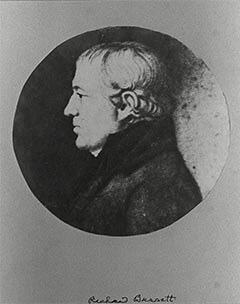
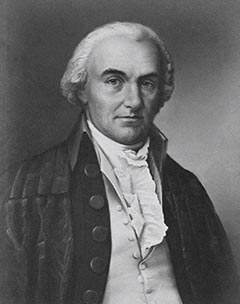
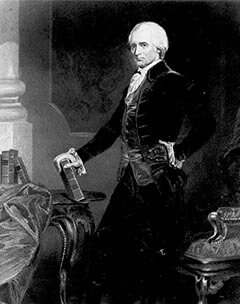
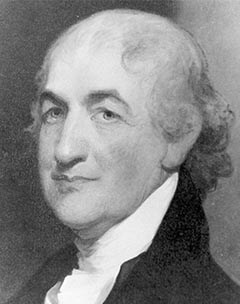
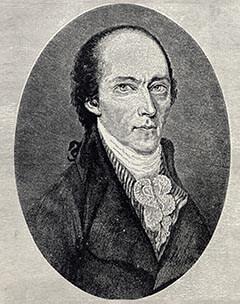
In order: Senators Bassett (DE), Ellsworth (CT), Lee (VA), Strong (MA) and Maclay (PA). Credit: U.S. Senate Historical Office
Other special committees formed to revise or reexamine the Senate rules and to recommend changes therein, were created from time to time until April 17, 1867. On this date a committee of three Senators was appointed "to revise the rules of the Senate, and to report thereon early in the next session." This committee became known as the Select Committee on the Revision of the Rules and, as such, was a continuous committee until December 9, 1874, when it was designated as a standing committee to be known as the Committee on Rules.
From 1789, when the first committee was appointed, until 1867, the beginning of a continuous committee on rules, the Senate created nine special committees to revise the rules of the Senate, but only seven (3) filed reports to the Senate, and, pursuant to such reports during that time, the Senate adopted three general revisions of its rules, none of which were at the beginning of a new session. During that same period, the Senate occasionally amended its existing rules and adopted various procedural orders, some or most of which were included in the body of the rules when each next general revision was adopted.
The select committee, begun in 1867, consisted of three Senators and was directed by resolution adopted on April 13, "to revise the rules of the Senate, and to "report thereon early in the next session." The committee filed its report, which was ordered printed, on February 21, 1868, and the Senate adopted this general revision of its rules on March 25, 1868. On December 21, 1874, the Senate adopted a resolution instructing the standing Committee on Rules "to consider the propriety of revising and reclassifying the rules of the Senate," and that it report accordingly at the earliest day practicable. The committee made its first report on March 2, 1875, which was ordered printed and recommitted.
On July 14, 1876, the committee filed another report on rules revision; the Senate proceeded to consider this report on December 18, 1876, which it recommitted on the same day. On December 26, 1876, the Committee filed another report which was ordered to lie on the table. The Senate began consideration of this report on January 15, 1877, and after three days of consideration and the adoption of various amendments, the revision of the rules was adopted on January 17, 1877.
On March 2, 1883, the Senate adopted a resolution instructing the standing Committee on Rules “to sit during the recesses of Congress, at Washington or elsewhere, for the purpose of revising, codifying, and simplifying the rules of the Senate." On December 10 of that year, a report was submitted, which the Senate began to consider on December 13 and continued with from time to time until January 11, 1884, when another general revision of the rules was adopted.
On May 10, 1976, the Senate adopted Senate Resolution 156 (submitted by Mr. Byrd, the majority leader) to authorize and direct the Committee on Rules and Administration to prepare a revision of the Standing Rules of the Senate. On November 7, 1979, a report was filed pursuant to the above resolution in the form of Senate Resolution 274 (submitted by Mr. Byrd for himself and Mr. Baker, the minority leader), to revise and modernize the Standing Rules of the Senate without substantive change in Senate procedure and to incorporate therein certain other rules of the Senate. The resolution was called up on November 14, 1979, and passed by a vote of 97 to 0, after a brief discussion thereon.
.jpg)
Senators Byrd & Baker. Credit: U.S. Senate Historical Office
Between 1884 and 1979, many changes were made in the rules of the Senate and its procedure. The history of these changes has been piecemeal. Some amendments to the rules were proposed by the Rules Committee in the form of resolutions reported by that committee and adopted by the Senate, and some resolutions amending the rules in various ways were submitted, considered, and passed immediately or soon thereafter without reference to a committee. Some changes were made by the Senate agreeing to unanimous consent requests to that effect, and precedents and practices of the Senate since 1884 have had a great effect on the rules and procedure. Additionally, some changes were made by a combination of the above methods. For example, one of the most controversial provisions of the changes in the Senate rules since 1884 includes the cloture rule. The Committee on Rules reported S. Res. 195 on May 16, 1916, to amend Rule XXII to provide for a cloture procedure. It was debated but did not come to a vote. On March 7, 1917, the Senate was called into special session, and Senator Martin of Virginia submitted a resolution (S. Res. 5) to provide for a cloture procedure. It was similar to the resolution reported by the committee and was adopted on March 8, 1917. A number of amendments have been made to this rule -- some reported and adopted; and some submitted, called up for consideration without reference to a committee and adopted. The so-called post-cloture amendment to rule XXII, adopted in 1979, was called up without reference and adopted, but the Committee on Rules and Administration had reported a resolution in the previous Congress containing a section therein that was very similar to the resolution adopted in 1979.
The history of special committees on Rules before the creation of a standing committee on Rules.
The Senate first convened on March 4, 1789 without a quorum (only eight Senators appeared) and without any rules. It was not until April 6 that a quorum of the membership appeared. During the interim, the Senate adjourned from day to day without transacting any business except acting on proposed communications to absent members requesting their attendance.
On April 7, a special committee to prepare and propose a system of rules was created (Journal, p. 10) as follows:
Ordered, That Mr. Ellsworth, Mr. Lee, Mr. Strong, Mr. Maclay, and Mr. Bassett, be a committee to prepare a system of rules to govern the two Houses in cases of conference, and to take under consideration the manner of electing Chaplains, and to confer thereupon with a committee of the House of Representatives.
Ordered, That the same committee prepare a system of rules for conducting business in the Senate.
This committee performed its assignment and filed a report on April 13, 1789, proposing 19 rules for conducting business in the Senate. The report was adopted on April 16, 1789, which gave the Senate the following 19 rules (Journal, p.13):
The, report of the committee appointed to determine upon rules for conducting business in the Senate, was agreed to. Whereupon,
Resolved, That the following rules, from No. I, to XIX, inclusive, be observed.
I. The President having taken the chair, and a quorum being present, the journal of the preceding day shall be read, to the end that any mistake may be corrected that shall have been made in the entries.
II. No member shall speak to another, or otherwise interrupt the business of the Senate, or read any printed paper while the journals or public papers are reading, or when any member is speaking in any debate.
III. Every member, when he speaks, shall address the chair, standing in his place, and when he has finished, shall sit down.
IV. No member shall speak more than twice in any one debate on the same day, without leave of the Senate.
V. When two members rise at the same time, the President shall name the person to speak; but in all cases the member first rising shall speak first.
VI. No motion shall be debated until the same shall be seconded.
VII. When a motion shall be made and seconded, it shall be reduced to writing, if desired by the President, or any member, delivered in at the table, and read by the President, before the same shall be debated.
VIII. While a question is before the Senate, no motion shall be received unless for an amendment, for the previous question, or for postponing the main question, or to commit it, or to adjourn.
IX. The previous question being moved and seconded, the question from the Chair shall be: "Shall the main question be now put?" And if the nays prevail, the main question shall not then be put.
X. If a question in debate contains several points, any member may have the same divided.
XI. When the yeas and nays shall be called for by one-fifth of the members present, each member called upon shall, unless for special reasons he be excused by the Senate, declare, openly and without debate, his assent or dissent to the question. In taking the yeas and nays, and upon the call of the House. the names of the members shall be taken alphabetically.
XII. One day's notice at least shall be given of an intended motion for leave to bring in a bill.
XIII. Every bill shall receive three readings previous to its being passed; and the President shall give notice at each, whether it be the first, second, or third; which readings shall be on three different days, unless the Senate unanimously direct otherwise.
XIV. No bill shall be committed or amended until it shall have been twice read, after which it may be referred to a committee.
XV. All committees shall be appointed by ballot, and a plurality of votes shall make a choice.
XVI. When a member shall be called to order, he shall sit down until the President shall have determined whether he is in order or not; and every question of order shall be decided by the President, without debate; but, if there be a doubt in his mind, he may call for the sense of the Senate.
XVII. If a member be called to order for words spoken, the exceptionable words shall be immediately taken down in writing, that the President may be better enabled to judge of the matter.
XVIII. When a blank is to be filled, and different sums shall be proposed, the question shall be taken on the highest sum first.
XIX. No member shall absent himself from the service of the Senate without leave of the Senate first obtained.
Two days later (April 18) the Senate adopted the following motion, giving the Senate a total of 20 rules (Journal, p. 14):
On motion, Resolved, That the following be subjoined to the standing orders of the Senate:
XX. Before any petition or memorial, addressed to the Senate, shall be received and read at the table, whether the same shall be introduced by the President, or a member, a brief statement of the contents of the petition or memorial shall verbally be made by the introducer.
After the first session of the first Congress, a considerable number of orders and resolutions to study a particular rule or a general revision of the rules were adopted before the Rules Committee became a standing committee. This review will concern itself only with the creation of special committees which were concerned with a general revision of the rules as opposed to those created to explore a certain procedure or particular operations of the Senate. There were more special committees created to study general revisions of the rules than there were general revisions adopted; some committees never filed a report and others filed reports which were rejected.
During the entire history of the Senate, only seven general revisions of the rules since 1789 have been adopted, namely: March 26, 1806; January 3, 1820; February 14, 1828; March 25, 1868; January 17, 1877; January 11, 1884; and November 14, 1979. The last three revisions were considered and reported by the standing Committee on Rules before being adopted by the Senate.
(1) Quoted from the 1801 edition, printed in Washington, D.C.
(2) The Senate was first called to order on March 4, 1789, but a quorum was not present. The Senate adjourned from day to day without transacting any business - except to agree on communicating with the absent Senators to request their presence - until April 16, 1789, when a quorum appeared.
(3) One report did not propose a general revision-only amendments to three of the existing rules.